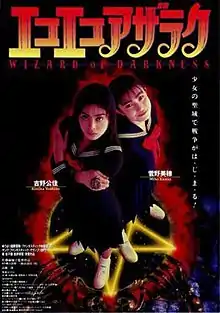Eko Eko Azarak: Wizard of Darkness
Eko Eko Azarak: Wizard of Darkness (エコエコアザラク -WIZARD OF DARKNESS-) is a 1995 Japanese horror film directed by Shimako Sato. The film is based on the manga Eko Eko Azarak, and stars Kimika Yoshino as a transfer student to a new school, who is secretly a witch travelling from school to school in order to dispel the work of the devil.
| Eko Eko Azarak: Wizard of Darkness | |
|---|---|
 | |
| Directed by | Shimako Sato |
| Produced by |
|
| Screenplay by | Junki Takegami[1] |
| Story by | Shinichi Koga |
| Based on | Eko Eko Azarak by Shinichi Koga |
| Starring |
|
| Music by | Mikiya Katakura[2] |
| Cinematography | Shoei Sudo[2] |
Production companies |
|
Release date |
|
Running time | 82 minutes[2] |
| Country | Japan |
| Language | Japanese |
The film was shown at the Toronto International Film Festival in 1995. The film was followed by two sequels, starting with Eko Eko Azarak II: Birth of the Wizard in 1996.
Plot
A mysterious cabal of red-garbed magicians have been murdering inhabitants of an unnamed Japanese city. Their latest victim is a woman who is decapitated while the magicians perform a ritual with a voodoo doll. The object of the murders to provide the five geographical points of a giant pentagram, with a high school in the nexus. The magicians' ultimate aim is to summon Lucifer himself.
Misa Kuroi, a transfer student at the school, is a witch of considerable power and has come to battle the evil magicians. However, Misa has some difficulty getting classmates to trust her.
Cast
- Kimika Yoshino as Misa Kuroi
- Miho Kanno as Mizuki Kurohashi
- Miho Tamura as Maki Yoshida
- Kanori Kadomatsu as Kazzumi Tanaka
Production
Shimako Sato, the director of Eko Eko Azarak: Wizard of Darkness, had previously filmed Tale of a Vampire (1992) in the United Kingdom.[1][4] She returned to Japan with the desire to make a film about witchcraft and magic.[4] She recalled the manga series Eko Eko Azarak from the 1970s, and began adapting it for cinema.[4]
The film was shot in two weeks, and featured the cinematic debut of Kimika Yoshino.[4] Yoshino received her script a day before shooting had started and before she had even met the director.[4] .
Release
Eko Eko Azarak: Wizard of Darkness was released in Japan on April 8, 1995.[2] It was shown at the Toronto Film Festival in September 1995.[3]
A DVD of the film was released by Tokyo Shock on December 16, 2003.[5] The disc included footage of the films premiere, the trailer, and interviews with the director and Kimika Yoshino.[5]
Reception
Variety gave the film a positive review, referring to it as "high-octane, modestly produced occult thriller is top-notch genre fare", and that "obviously plowing a familiar celluloid field, director/co-writer Sato demonstrates not only a visual flair for the genre, but a wicked sense of humor that deftly counterbalances the per force conventions of this type of story."[3]
The film won the Minami Toshiko Award at the 1995 Yubari International Fantastic Film Festival.[6] It was also selected for the official competition for best film at the 1997 Fantasporto.[7]
Aftermath
Shimako Sato returned to the direct the follow-up film Eko Eko Azarak II: Birth of the Wizard (1996).[4][8]
Notes
- Kalat 2007, p. 271.
- Kalat 2007, p. 272.
- Klady, Leonard (October 23, 1995). "Review: 'Wizard of Darkness'". Variety. Retrieved October 25, 2015.
- Kalat 2007, p. 59.
- "Eko Eko Azarak: Wizard of Darkness (1995)". AllMovie. Retrieved October 25, 2015.
- "Yubari International Fantastic Film Festival Archive". yubarifanta.com. Archived from the original on 2011-07-18. Retrieved 2009-09-17.
- ""Bound" and "Unhook the Stars": Winners of the two competitive sections Of Fantasporto'97". Fantasporto. Archived from the original on August 1, 1997. Retrieved June 3, 2009.
- Sharp 2011, p. 108.
References
- Sharp, Jasper (2011). Historical Dictionary of Japanese Cinema. Scarecrow Press. ISBN 0810875411.CS1 maint: ref=harv (link)
- Kalat, David (2007). J-horror: The Definitive Guide to The Ring, The Grudge and Beyond. Vertical. ISBN 193223408X.CS1 maint: ref=harv (link)
External links
- Eko Eko Azarak: Wizard of Darkness at IMDb
- Eko Eko Azarak II: Birth of the Wizard at IMDb
- Eko Eko Azarak: Misa the Dark Angel at IMDb